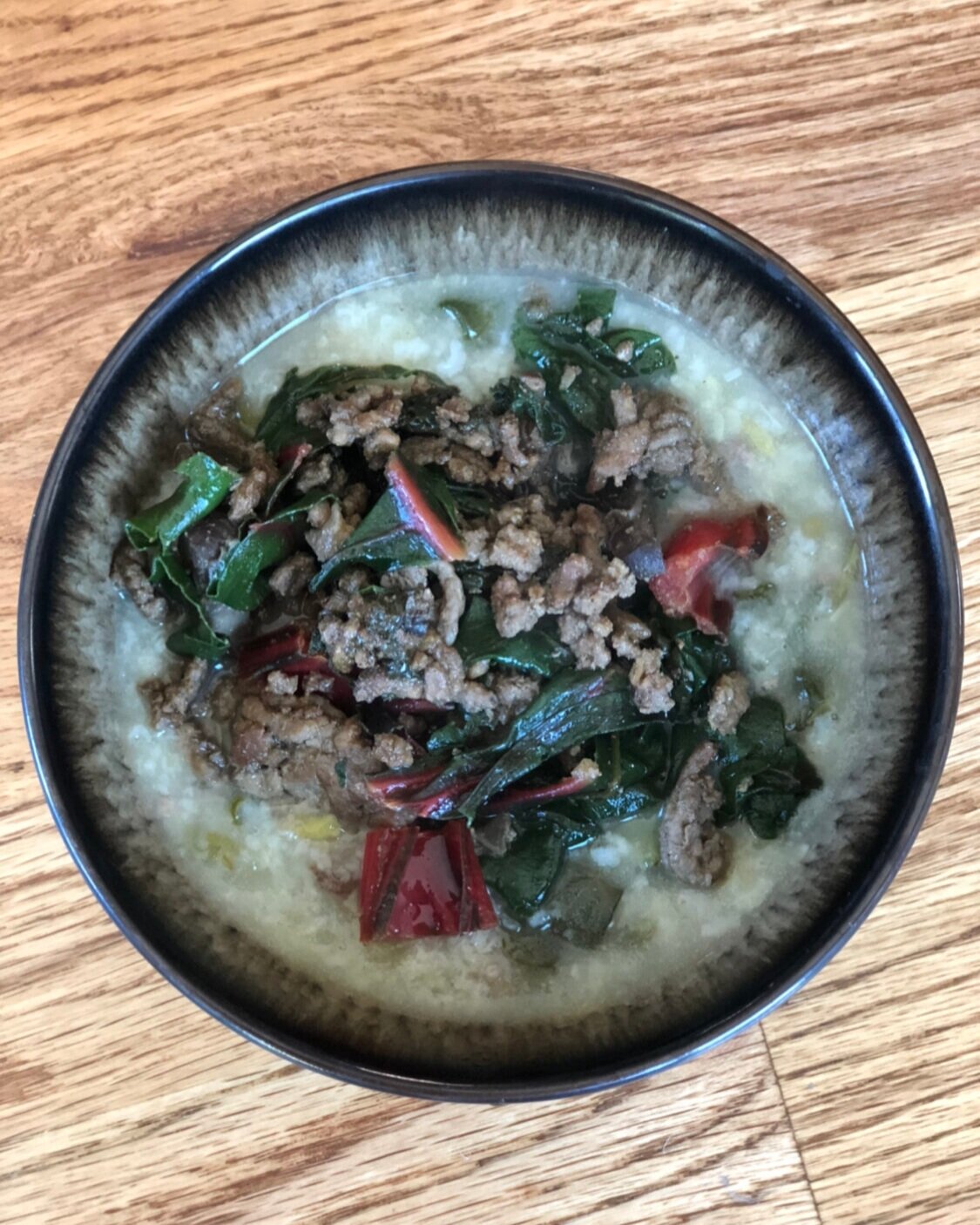by Salvador Cefalu, M.S., L.Ac.
In Chinese culture, porridge, known as congee, is an essential food for health and rejuvenation.
Congee is essentially a thick soup that can be made using a variety of different grains and sometimes legumes such as adzuki and mung beans.
Though rice is traditionally the most common grain used for this soup, millet and barley are common substitutes because of their unique therapeutic properties.
Millet has the ability to nourish the Yin of the Lungs and Stomach to support hydration and barley is used to nourish blood, cool the Liver and strengthen the digestive system when there is bloating and a weak appetite. Barley can also help build muscle and drain excessive fluid stagnation.
The History of Congee as Medicine
The popularization of congee for medicinal purposes goes back to the Tang Dynasty, the period between 618 to 907 AD, considered to be one of the glorious and progressive periods of civilization in Chinese history.
Much later during the Ming Dynasty (1368-1644), one of the most prominent physicians in the history of Chinese Medicine, Li Shi-zhen listed 62 medicinal congees in his classic herbal compendium called Ben Cao Gan Mu, or The Great Outline of Materia Medica.
Today, congee has become a daily staple in Chinese cuisine and an important part of healing regimens for people with digestive disorders and general weakness.
Hydration as a Basis for Yin Nourishment
The Yin aspect of the body relates to the fluids and its structure. Therefore, hydration along with protein dense foods that nourish collagen are critical to maintain your Yin and keep your body’s tissues moist, your joints supple, your skin and muscles firm, your hair lustrous and blood vessels strong.
The word collagen is rooted in the Greek word '“kolla” meaning glue, denoting the important function of collagen to help maintain the integrity and elasticity of your structure.
As we’ve all experienced, when glue dries up it loses its ability to bind and hold things together. The same thing happens as we age—our collagen dries up and the body gets brittle and flabby.
Your body’s hormones are also a form of Yin. As Yin declines with aging, the hormones become depleted and along with this development are symptoms of dryness including dry skin, dry joints, dry eyes, and dry mucous membranes.
The decline of Yin is a natural process of aging, but this process of degeneration can be sped up or slowed down depending on your lifestyle.
Yin dries up when heat is generated by the body through any form of excess in your life.
This can be a result of overwork, excessive exercise, excessive exposure to the sun, excessive use of stimulants, alcohol and certain medications, and excessive sexual activity.
How to Support Your Yin
Diet is a key component to support the nourishment of your Yin.
If your diet is moistening and hydrating, your Yin will tend to be healthy. On the other hand, if your diet is too drying which generates heat, this will tend to damage your Yin and lead to accelerated aging.
What you eat thus makes a huge difference in maintaining your constitutional Yin and your exposure to foods that are drying, overheating and overstimulating all contribute to a more rapid deterioration of your Yin.
Since your dietary choices determine to a great extent how you nourish your Yin, this gives you the power to support this critical aspect of your body and your life.
According to Chinese Medicine, the Spleen and Stomach organs are the basis of postnatal nourishment by supporting the production of Stomach Yin.
Stomach Yin equates to the fluids generated by the digestive process that maintain the Yin for all the other systems of the body.
Stomach Fluids as the Basis of Wellness
The Yin produced by the Stomach is called the Jin-Ye which is simply known as the Stomach Fluids. In Chinese Medicine, however, the Jin and the Ye are different types of fluids that support different structures.
Jin is considered to be the Thin Fluids and Ye is the Thick Fluids.
A western medical association would be the fluids produced and released by the exocrine glands are Thin Fluids and fluids released by the endocrine glands are Thick Fluids.
Exocrine glands secrete fluid through ducts both internally and to the exterior of the body. Endocrine glands, on the other hand, secrete fluids (including hormones) directly into the blood to regulate metabolism, growth, reproduction and other functions.
The Thin ‘Jin’ exocrine fluids moisten the sensory orifices including the eyes, nose, mouth and ears so they can function properly and discharge fluids to the exterior.
The Thin Fluids also nourish the skin to produce sweat and help nourish the skin, the hair and the sinews to keep the tendons strong and supple.
The Thin Jin fluids also transform into Wei Qi, which is not a liquid but a gaseous state that flows both internally and externally to provide protection as it supports your immune system. Through the transformation of the Thin Jin Fluids into Wei Qi, the thyroid gland also gets supported by the Stomach’s Yin.
The Thick Ye endocrine fluids, on the other hand, condense and become heavy which draws the thick Ye fluids inward into the level of something solid to nourish the organs, the bones, the marrow, and the brain.
The Thick Ye Fluids are also the basis for the body’s sexual reproductive hormones indicating how diet is key in supporting not only fertility but also regeneration of the body.
Eat Congee to Nourish Your Stomach Yin
Soups and stews are a fundamental way to nourish your fluids and support all of these important systems.
The basic recipe to cook soupy rice congee is as follows:
Preparation: rinse the rice. For long grain and especially brown rice, after rinsing cover the rice with water in a bowl and soak overnight in the refrigerator. Pour the water out then cook. This will allow the rice to break-up more in the cooking process and create a creamier porridge.
Cook 1 cup rice to 5-8 cups of water to create a soupy gruel. The more starchy short-grain rice makes for a more creamy congee but long grain basmati and brown rice can also be used. First bring the water to boil, add the rice and reduce the flame to a simmer.
Add sea salt or pink Himalayan salt to taste. Cook for 2 or more hours depending on the consistency you want to create.
If you intend to create a soupy congee, put more water and cook longer. If you want a more savory and nourishing congee, substitute Bone Broth for a portion of the water.
Congee can also be prepared in a crock pot overnight.
After preparing the basic soup, you can add meat and vegetables to your taste to enhance the flavor of the congee and add in extra protein and nutrients.
Modifications:
Add 5 individual scallions (green onion) chopped with about 1 inch chunk of ginger sliced or diced.
Scallions and ginger are included especially when a person feels an acute chill and body aches with early onset of a cold. If a person tends to just feel sensitivity to cold, a weak appetite, symptoms of nausea, then simply adding ginger is best to warm up the Spleen and Stomach and enhance digestion.
Ginger is also anti-inflammatory and therefore benefits indigestion or gastric upset due to stomach inflammation caused by a deficiency of stomach acid (hydrochloric acid/HCL), or what is called Cold in the Stomach according to Chinese Medicine.
To add more protein to your congee, you can consider stirring in about 5 grams of Collagen Peptides and this can be consumed 2-3 times per day.
And as the photo suggests, you can add in meat and vegetables to your cooked congee to create a more wholesome meal.
When to Be Cautious with Regular Consumption of Congee
Even though one of the great benefits of congee is its hydrating property, the most common grain used for its preparation is rice which is a diuretic. Therefore if you suffer from frequent or excessive urination, known as polyuria, you need to eat rice congee with some caution so as to not overstimulate the loss of fluids.
Polyuria is often rooted in a Qi deficiency and more severely excessive urination can be associated with a Yang deficiency if a person is also very cold and weak.
In addition, barley and mung beans are often eaten as porridge for detoxification and these too are diuretics. So extra caution needs to be taken if excessive urination is a problem since diuretics will further drain the Qi and exhaust the Yang making a person colder and weaker.
Therefore, if you want to use congee to build back the strength of your digestive system and polyuria is a concern, I suggest using millet rather than rice or barley to reduce the diuretic effect of your porridge.
In Summary
Nourishing your Stomach Fluids through hydrating foods is fundamental to nourish every aspect of your body.
Congee which is most commonly a rice porridge that is also made from a other grains and some legumes is a staple in Chinese cuisine to nourish Stomach fluids, restore gut health and heal a variety of health disorders.
In fact, there are a plethora of modifications to make congee a medicine to remedy many health conditions. This article is an introduction to this rich and important part of Chinese Medicine cuisine and we’ll be presenting specific recipes used to address many of today’s common ailments in our nutrition program that will be available soon.
Want to know how to
heal yourself with food?
Learn to use Classical Chinese Dietetics to create your custom nutrition plan so you can let go of overwhelm with food for good. Join the waitlist to get free insights & be the first to know when enrollment opens for our one-of-a-kind course.
Salvador Cefalu, M.S., L.Ac. is Founder & Co-Director of A Center for Natural Healing in Santa Clara, CA, a wellness clinic he runs with his wife, Setareh Moafi, Ph.D., L.Ac., that specializes in Classical Chinese Medicine & Japanese Meridian Therapy, a rare non-insertion form of Acupuncture using Gold and Silver needles. Learn more at www.acenterfornaturalhealing.com.
Setareh Moafi, Ph.D., L.Ac. is Co-Owner and Director of A Center for Natural Healing in Santa Clara, California, a health and wellness clinic that specializes in Classical Chinese Medicine and Traditional Japanese Acupuncture. Dr. Moafi offers a one-of-a-kind form of empowerment coaching, clinical services, and transformational workshops and online courses that blend the ancient practices of Classical Chinese Medicine and Yoga. More information at www.setarehmoafi.com.



